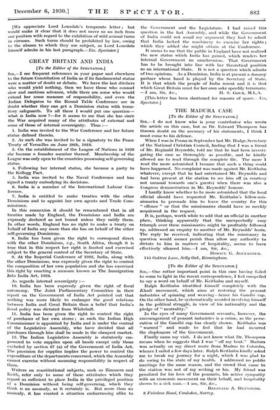GREAT BRITAIN AND INDIA
[To the Editor of the 51.FL-re:roe.] STR,—I see frequent references in your paper and elsewhere to the future Constitution of India as if its fundamental status were a matter of doubt or debate. We have the last ditchers who would yield nothing, then we have those who counsel slow and cautious advance, while there are some who would extend her some measure of responsibility, and even the Indian Delegates to the Round Table Conference are in doubt whether they can get a Dominion. status with trans- itory safeguards. To all these I would put one question— what is India now 1—for it seems to me that she has since the War acquired many of the attributes of external and some of those of internal sovereignty. Thus :— I. India Was invited to the War Conference and her future status defined therein.
2. As such she was invited to be a signatory to the Peace Treaty of Versailles on June 28th, 1919.
3. On the establishment of the League of Nations in 1920 she became a founder member thereof. Membership of the League was only open to the countries possessing self-governing status.
4. Following her internal status, she became a party to the Kellogg Pact.
5. India was invited to the Naval Conference and has signed a treaty embodying its decisions.
6. India is a member of the International Labour Con- ference.
1. India is entitled to make treaties with the other Dominions and to appoint her own agents and Trade Com- missioner.
In this connexion it should be remembered that in all treaties made by England, the Dominions and India are expressly declared as not bound unless they ratify them. In other words, England has no right to make a treaty on behalf of India any more than she has on behalf of the other self-governing Dominions.
8. India has been given the right to correspond direct with the other Dominions, e.g., South Africa, though it is true that in this respect her right is limited and exercised subject to the general control of the Secretary of State.
9. At the Imperial Conference of 1922, India, along with the other Dominions, was expressly given the right to control the composition of her own population and she has exercised this right by enacting a measure known as The Immigration Into India Act, 1924.
As regards internal sovereignty :— 10. India has been expressly given the right of fiscal autonomy. The Joint Parliamentary Committee in their report on the Government of India Act pointed out that nothing was more likely_ to endanger the good relations between India and Great Britain than a belief that India's fiscal policy was dictated from Whitehall.
11. India has been given the right to control the right of purchases of her own stores ; as, such. the Indian High Commissioner is appointed by India and is under the control of the Legislative Assembly, who have decided that all purchases through him shall be made in the eheapest market.
12. The Indian Legislative Assembly is statutorily em- powered to vote supplies upon all heads except only those excluded by section 67 (a) of the Government of India Act. The provision for supplies implies the power to control the expenditure of the departments concerned, which the Assembly cannot exercise without assuming responsibility in respect of them.
Writers on constitutional subjects, such as Zimmerli and
Keith, refer only to some of these attributes which they regard as sufficient to place India in the privileged position of a Dominion without being self-governing, which they think is an anomaly, as it certainly is. But more than an anomaly, it has created a situation embarrassing alike to the Government and the Legislature. I had raised this question in the last Assembly, and while the Government of India could not assail ray argument they had to admit that India lacked the machinery to exercise her rights ; which they added she might obtain at the Conference.
It seems to me that the public in England have not realized the new status which India has gained, which renders her internal Government an anachronism. That Government has to be brought into line with her theoretical position as an international State. It is not a question which admits of two opinions. As a Dominion, India is at present a dummy partner whose hand is played by the Secretary of State. It is that which the people of India resent and it is that which Great Britain must for her own sake speedily terminate.
—I am, Sir, &e., H. S. COUR, M.L.A. [This letter has been shortened for reasons of space.—Eu. Spectator.]


























































 Previous page
Previous page